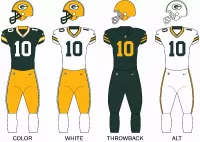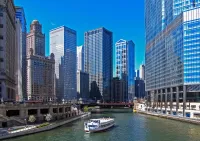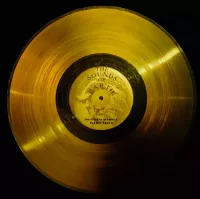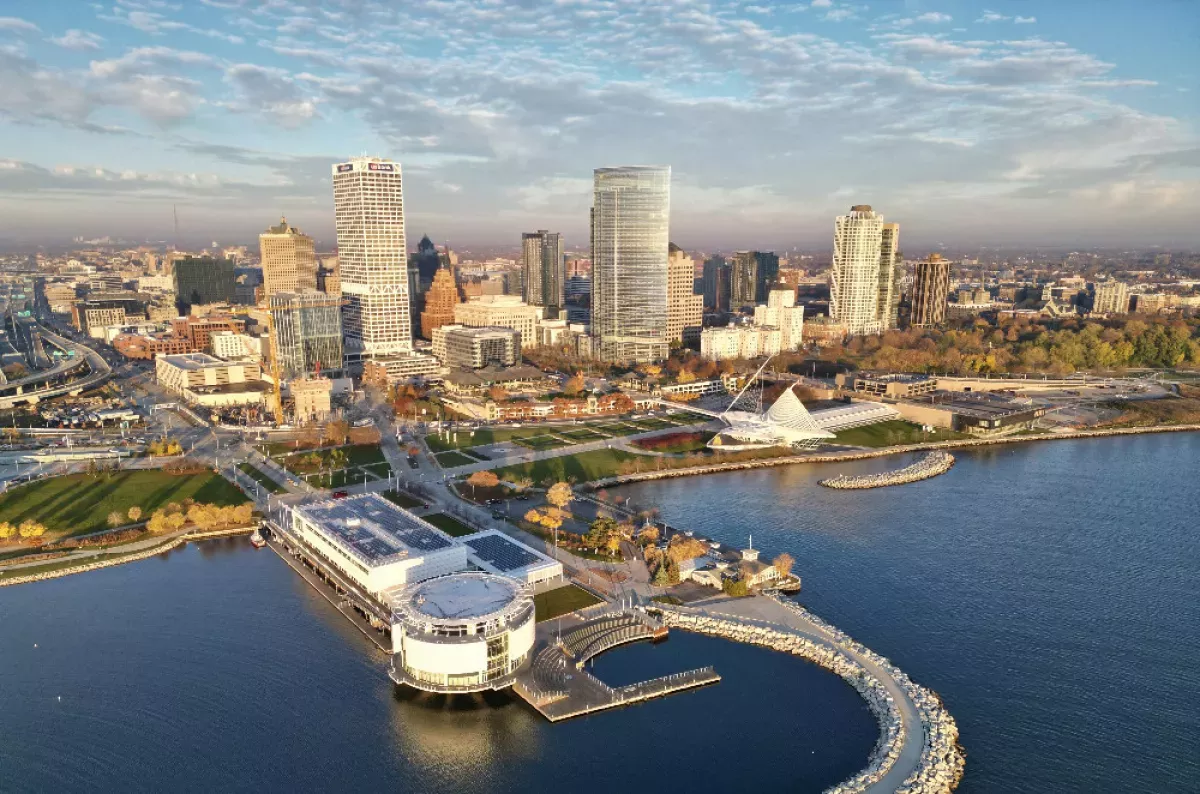Milwaukee is the most populous city in Wisconsin and sits on the western shore of Lake Michigan. With a population of 577,222 in 2020, it ranks as the 31st-largest city in the United States and the fifth-most populous in the Midwest. The Milwaukee metropolitan area has over 1.57 million residents, making it the 40th-largest in the nation. Milwaukee also serves as the county seat of Milwaukee County.
1900: German Population in Milwaukee
By 1900, 34 percent of Milwaukee's population was of German background, solidifying its reputation as one of the most German of American cities.
1900: Incorporation of East Milwaukee
In 1900, East Milwaukee, later known as Shorewood, was incorporated as a suburb of Milwaukee.
1902: Incorporation of West Allis
In 1902, West Allis was added to the first generation of "inner-ring" suburbs of Milwaukee.
1906: Incorporation of West Milwaukee
In 1906, West Milwaukee was incorporated, completing the first generation of "inner-ring" suburbs around Milwaukee.
1910: Emil Seidel Elected Mayor
In 1910, Emil Seidel was elected as mayor of Milwaukee, running on the ticket of the Socialist Party.
1910: Milwaukee Population of Foreign-Born Residents
In 1910, Milwaukee shared the distinction with New York City of having the largest percentage of foreign-born residents in the United States, with European descendants representing 99.7% of the city's total population.
October 14, 1912: Assassination attempt on Theodore Roosevelt
On October 14, 1912, former president Theodore Roosevelt survived an assassination attempt by John Fleming Shrank while giving a speech at the Gilpatrick Hotel.
1915: Polish Community Growth
By 1915, Milwaukee County's Polish population rose to 100,000, establishing one of the largest Polish-American communities in the U.S.
1916: Daniel Hoan Elected Mayor
In 1916, Daniel Hoan was elected as mayor of Milwaukee, running on the ticket of the Socialist Party.
November 24, 1917: Bombing at Milwaukee Police Station
On November 24, 1917, a bomb exploded at the central police station in Milwaukee, killing nine members of the department and one civilian. It was suspected to be the work of anarchists.
1919: Ogren automobile makers
Early in the 20th century, Milwaukee was home to Ogren automobile makers from 1919 to 1922.
1922: Ogren automobile makers
Early in the 20th century, Milwaukee was home to Ogren automobile makers from 1919 to 1922.
1922: NFL's Badgers
Milwaukee was home to the NFL's Badgers from 1922 to 1926.
1925: Mexican Population in Milwaukee
By 1925, around 9,000 Mexicans lived in Milwaukee, before the Great Depression forced many to move back south.
1926: NFL's Badgers
Milwaukee was home to the NFL's Badgers from 1922 to 1926.
1933: Green Bay Packers home games
From 1933 to 1994, the Green Bay Packers split their home schedule between Green Bay and Milwaukee.
July 24, 1934: Record High Temperature
On July 24, 1934, Milwaukee recorded its highest temperature of 105 °F (41 °C).
1940: Daniel Hoan's Mayoral Term Ends
In 1940, Daniel Hoan's term as mayor of Milwaukee came to an end, after having been in office since 1916 and running on the ticket of the Socialist Party.
1947: Hal Leonard Corporation founded
Hal Leonard Corporation, one of the world's largest music print publishers, was founded in 1947 and is headquartered in Milwaukee.
1948: Frank Zeidler Elected Mayor
In 1948, Frank Zeidler was elected as mayor of Milwaukee, running on the ticket of the Socialist Party.
1952: Joseph Kentenich exiled
Milwaukee is the city where Joseph Kentenich was exiled from 1952 to 1965.
1954: Charles J. Kersten lost his seat
In 1954, Republican Charles J. Kersten lost his seat in the 5th congressional district to Democrat Henry S. Reuss.
1959: Mitchell Park Horticultural Conservatory
Construction of the Mitchell Park Horticultural Conservatory's beehive-shaped glass domes began in 1959 and continued until 1967.
1960: African American Population in Milwaukee
In 1960, African-American residents made up 15 percent of Milwaukee's population, yet the city was still among the most segregated of that time.
1960: Frank Zeidler's Mayoral Term Ends
In 1960, Frank Zeidler's term as mayor of Milwaukee came to an end, after having been in office since 1948 and running on the ticket of the Socialist Party.
1960: Milwaukee's Peak Population
In 1960, Milwaukee's population peaked at 741,324, with the city's population reported as 91.1% white and 8.4% black by the Census Bureau.
1964: Segregation index
Milwaukee's segregation information in 2002 was based on a segregation index developed in the mid-1950s and used since 1964.
1965: Joseph Kentenich exiled
Milwaukee is the city where Joseph Kentenich was exiled to from 1952 until 1965.
1967: Mitchell Park Horticultural Conservatory
Construction of the Mitchell Park Horticultural Conservatory's beehive-shaped glass domes began in 1959 and continued until 1967.
1968: Summerfest founded
Summerfest, Milwaukee's most famous music venue, was founded in 1968.
1970: Population decline
Since the census count in 1970, Milwaukee's population has dropped at every census count.
1973: Completion of the U.S. Bank Center
In 1973, the U.S. Bank Center, the tallest building in Milwaukee at 601 feet, was completed.
1981: Brewing capacity
As late as 1981, Milwaukee had the greatest brewing capacity in the world.
January 17, 1982: Record Low Temperature
On January 17, 1982, Milwaukee recorded a record low temperature of -26 °F (-32 °C).
1988: Henry Maier retired
In 1988, 28-year incumbent Henry Maier retired as mayor, holding the record for longest term of service for a city of Milwaukee's size at the time.
1988: Mayor John O. Norquist elected
In 1988, with the election of Mayor John O. Norquist, Milwaukee adopted a cabinet form of government, allowing the mayor to appoint department heads, giving the mayor greater control over the city's day-to-day operations. The Common Council retained control over finances.
1990: Milwaukee offered school voucher program
In 1990, Milwaukee became the first city in the United States to offer a school voucher program.
1991: Packers revenue
By 1991, the Packers claimed that revenue from the Milwaukee games were 60% of the revenue generated from the Green Bay games.
1992: Milwaukee Name Origin Popularized by Alice Cooper in Wayne's World
In 1992, Alice Cooper popularized one theory about the origin of Milwaukee's name in the comedy film "Wayne's World". The theory is that it comes from the Anishinaabemowin/Ojibwe word mino-akking, meaning "good land".
1994: Green Bay Packers home games
From 1933 to 1994, the Green Bay Packers split their home schedule between Green Bay and Milwaukee.
February 4, 1996: Record Low Temperature
On February 4, 1996, Milwaukee matched its record low temperature of −26 °F (−32 °C).
1999: Guinness Book of World Records
In 1999, Summerfest was listed in the Guinness Book of World Records as the largest music festival in the world.
2001: Milwaukee ranked among most dangerous cities
In 2001, Milwaukee was ranked among the ten most dangerous large cities in the United States.
2002: Segregation in the U.S.
In 2002, a Jet Magazine article cited the Milwaukee metropolitan area as being the most segregated in the U.S.
2003: University of Wisconsin study
In 2003, a non-peer-reviewed study by researchers at the University of Wisconsin–Milwaukee claimed Milwaukee was not "hypersegregated" and ranked as the 43rd most integrated city in America.
2004: Milwaukee Police Department's Gang Unit Reactivated
In 2004, the Milwaukee Police Department's Gang Unit was reactivated after Nannette Hegerty was sworn in as chief.
2004: Hmong American Peace Academy opening
The Hmong American Peace Academy/International Peace Academy, a K–12 school system in Milwaukee centered on the Hmong community, opened in 2004.
2005: Milwaukee Public Market opening
Milwaukee Public Market, an indoor market selling local products, opened in the Third Ward neighborhood in 2005.
2006: Basilica designation
Holy Hill National Shrine of Mary, Help of Christians, northwest of Milwaukee in Hubertus, Wisconsin, was made a basilica in 2006.
2006: Charges brought against suspects through Gang Unit
In 2006, 4,000 charges were brought against suspects through Milwaukee's Gang Unit.
2006: Bronze-level status obtained
In 2006, Milwaukee obtained bronze-level status from the League of American Bicyclists.
2006: Milwaukee Named a Distinctive Destination
In 2006, Milwaukee was named one of the "Dozen Distinctive Destinations" by the National Trust for Historic Preservation, largely through its efforts to preserve its history.
2006: American Community Survey
In the 2006–2008 American Community Survey, 38.3% of Milwaukee residents reported having African American ancestry.
2006: Lawsuit filed
This "green" effort was part of a settlement of an asbestos lawsuit filed by the state against the county in 2006.
2007: Milwaukee ranked among most dangerous cities
In 2007, Milwaukee was ranked among the ten most dangerous large cities in the United States.
2007: Milwaukee Intermodal Station renovated
Milwaukee's Amtrak station was renovated in 2007 to create Milwaukee Intermodal Station near downtown Milwaukee and the Third Ward.
2008: Bike lanes plan created
In 2008, the city identified over 250 miles (400 km) of streets on which bike lanes will fit and created a plan labeling 145 miles (233 km) of those as high priority for receiving bike lanes.
2008: American Community Survey
The 2006-2008 American Community Survey indicated that 20.8% of Milwaukee residents reported German ancestry.
2008: Harley-Davidson Museum opening
The Harley-Davidson Museum, which pays tribute to Harley-Davidson motorcycles, opened in Milwaukee in 2008.
2009: City Becomes an Innovating City
In 2009, in response to algae blooms in Lake Michigan, Milwaukee became an "Innovating City" in the Global Compact Cities Program. Also, The Milwaukee Water Council was formed in 2009.
2009: Bicycle racks installed to buses
In 2009, the Milwaukee County Transit System began installing bicycle racks to the front of county buses.
2010: United States Census
According to research by demographer William H. Frey using data from the 2010 United States Census, Milwaukee has the highest level of black-white segregation of any of the 100 largest metropolitan areas in the United States.
2010: Milwaukee Population
By 2010, Milwaukee's population had decreased to 594,833, while the population of the overall metropolitan area increased.
2010: Federal funds allocated for high-speed rail
In 2010, $800 million in federal funds were allocated to the creation of high-speed rail links from Milwaukee to Chicago and Madison, but the funds were rejected by Wisconsin governor Scott Walker.
2010: Religious service attendance
In 2010, approximately 51.8% of residents in the Milwaukee area said they regularly attended religious services.
2010: 2010 Census
In the 2010 Census, 44.8% of Milwaukee's population was White, 40.0% was Black or African American, 0.8% American Indian and Alaska Native, 3.5% Asian, 3.4% from two or more races, and 17.3% of Hispanic, Latino, or Spanish origin.
2010: Peak traffic year
Mitchell International had its peak year of annual traffic in 2010, with 9.8 million passengers.
2012: Milwaukee crime rates compared to national average
As of 2012 Milwaukee fared worse when comparing specific crime types to the national average (e.g., homicide, rape, robbery, aggravated assault).
2012: Religious Affiliation
In 2012, 24.6% of the Milwaukee area population identified as Catholic, 10.8% as Lutheran, 1.6% as Methodist, and 0.6% as Jewish.
2012: Gamma city listing
In 2012, Milwaukee was listed as a gamma city by the Globalization and World Cities Research Network.
2012: US Water Prize Won
In 2012, Milwaukee won the US Water Alliance's US Water Prize for its holistic water treatment approach.
2013: Murders in Milwaukee
In 2013 there were 105 murders in Milwaukee.
2013: Hmong Studies Journal
In 2013, Mark Pfeifer, the editor of the Hmong Studies Journal, stated that Hmong in Milwaukee had recently been moving to the northwest side of Milwaukee.
2013: Point-In-Time survey estimated homeless people
In 2013, a Point-In-Time survey estimated 1,500 people were homeless on Milwaukee's streets each night.
August 2014: Bicycle sharing system debuted
In August 2014, Milwaukee debuted a bicycle sharing system called Bublr Bikes.
February 10, 2015: Streetcar approved
On February 10, 2015, a streetcar connecting the Milwaukee Intermodal Station with the city's Lower East Side was approved by the Common Council.
May 2015: Interstate 41 Designation
As of May 2015, the Interstate 894 bypass also contained Interstate 41, running through portions of the city's southwest side.
November 2015: Construction Begins on Fiserv Forum
In November 2015, construction commenced on the $524 million Fiserv Forum, a multipurpose arena designed to host the Milwaukee Bucks, Marquette Golden Eagles, and various ice hockey games.
2015: Walk Score ranking
A 2015 study by Walk Score ranked Milwaukee as the 15th most walkable out of the 50 largest U.S. cities.
2015: People killed in Milwaukee
In 2015, 146 people were killed in Milwaukee.
2015: Households without a car
In 2015, 17.9% of city of Milwaukee households were without a car.
2015: Interstate 41 approved
In 2015, Interstate 41 was approved, following I-94 north from the state line before turning west at the Mitchell Interchange.
2015: Worst city for black Americans
In 2015, Milwaukee was rated as the "worst city for black Americans" due to disparities in employment and income levels, high incarceration rates, and a severe educational achievement gap.
2015: Craft brewing companies
Since 2015, nearly two dozen craft brewing companies have been established in Milwaukee.
2015: Journal Communications split
Until 2015, Journal Communications published the Journal Sentinel and local weekly newspapers. In 2015, Journal was split into the Journal Media Group for publishing, while the television and radio stations went to the E. W. Scripps Company.
2016: Milwaukee ranked as second poorest city
As of 2016, Milwaukee ranked as the second poorest U.S. city with over 500,000 residents, falling behind only Detroit.
2016: Households without a car
In 2016, 18.7% of city of Milwaukee households were without a car.
2016: Journal Media Group merged with Gannett
In 2016, Journal Media Group merged with Gannett.
2016: WisDOT and IDOT conducted studies
In 2016, WisDOT and IDOT conducted studies to upgrade service on the Amtrak Hiawatha line from seven to ten times daily between downtown Milwaukee and downtown Chicago.
2016: American Community Survey estimates
The American Community Survey estimates for 2016-2020 showed that in 2016, the median household income was $43,125.
March 2017: Milwaukee Streetcar construction began
Construction on the Milwaukee Streetcar began March 2017, with initial operation by mid-2018.
2017: Summerfest attendance
In 2017, Summerfest attracted 831,769 attendees.
August 26, 2018: Fiserv Forum Opens
On August 26, 2018, Fiserv Forum, a $524 million multipurpose arena located at 1111 Vel R. Phillips Avenue, opened to the public, becoming the new home for the Milwaukee Bucks and Marquette Golden Eagles.
October 2018: Complete Streets policy enacted
Since October 2018, when it enacted a Complete Streets policy, the city continuously considers the addition of bicycle facilities to roadways as part of new road projects.
November 2, 2018: M-Line opened for service
The initial M-Line of the streetcar system, The Hop, opened for service on November 2, 2018, connecting Milwaukee Intermodal Station, downtown Milwaukee, and Ogden Avenue.
2018: Milwaukee Streetcar initial operation
Construction on the Milwaukee Streetcar began March 2017, with initial operation by mid-2018.
2018: Milwaukee Upholds Paris Agreement
In 2018, Milwaukee mayor Tom Barrett announced that the city would uphold its obligations under the Paris Agreement, despite the United States' withdrawal, and set a goal to move a quarter of the city's electricity sources to renewable energy by 2025.
2018: Scripps sold radio stations
In 2018, Scripps sold the radio stations to Good Karma Brands, effectively splitting off the monopoly completely.
2018: The Hop Streetcar and Fiserv Forum Open
In 2018, The Hop streetcar system began operation, and the Fiserv Forum also opened.
2019: Racial Segregation in Milwaukee
As of 2019, at least three out of four black residents in Milwaukee would have to move to create racially integrated neighborhoods.
2019: Silver-level status obtained
In 2019, Milwaukee obtained silver-level status from the League of American Bicyclists.
2019: Dangerous lead levels in children
In 2019, over 10% of children in Milwaukee tested positive for dangerous lead levels in their blood.
2019: Lakefront service was expected
The Milwaukee Streetcar's Lakefront service was expected to start operation by 2019.
2020: Milwaukee ranked as dangerous city
In 2020, Milwaukee was ranked the tenth most dangerous city in the US.
2020: Milwaukee Population in 2020
In 2020, the census recorded Milwaukee's population at 577,222, making it the 31st-most populous city in the United States and the fifth-most populous in the Midwest.
2020: United States census
In the 2020 United States census, Milwaukee's population was recorded as 577,222, with a population density of 6,001.2 inhabitants per square mile.
2020: American Community Survey estimates
In the American Community Survey estimates for 2016–2020, the median household income in Milwaukee was $43,125, and the median family income was $51,170.
2020: Census population
The 2020 census population of Milwaukee included 1,198 people incarcerated in adult correctional facilities and 9,625 people in university student housing.
January 2021: American Serb hall sale
In January 2021, the St. Sava Serbian Orthodox Cathedral put the American Serb hall up for sale due to financial challenges caused by the COVID-19 pandemic.
2021: Infrastructure bill and Amtrak Connects Us initiative
As a result of the 2021 infrastructure bill and the "Amtrak Connects Us" initiative, the Milwaukee Intermodal Station is again projected to serve passenger trains to Madison and Green Bay.
2021: Lead levels in drinking fountains
As of 2021, more than 3,000 drinking fountains in the Milwaukee Public School District existed, with 183 having lead levels above 15 parts per billion (ppb).
2021: MPS enrollment data
As of the 2021-2022 academic year, Milwaukee Public Schools (MPS) had an enrollment of 69,115.
2021: Tom Barrett retired
In 2021, Tom Barrett retired as mayor, becoming the longest-serving mayor of any of the United States' 50 largest cities.
2022: Commute statistics
According to the 2022 American Community Survey, 66% of working city of Milwaukee residents commuted by driving alone, 11.1% carpooled, 4.5% used public transportation, and 4.3% walked.
2022: Homeless estimate reduced
As of 2022 the estimate of homeless people has reduced to 832.
2022: On-street bicycle facilities
As of 2022, Milwaukee has 195 miles (314 km) of on-street bicycle facilities.
2022: MPS enrollment data
As of the 2021-2022 academic year, Milwaukee Public Schools (MPS) had an enrollment of 69,115.
2022: Port of Milwaukee handled cargo
Milwaukee's main port, the Port of Milwaukee, handled 2.3 million metric tons of cargo through its municipal port in 2022.
2022: American Community Survey estimates
Per the 2022 American Community Survey five-year estimates, the German American population was 87,601.
August 2023: System operates over stations
As of August 2023, the Bublr Bikes system operates over 100 stations in the city and neighboring West Allis and Wauwatosa.
October 29, 2023: L-Line opened for service
Service to the lakefront, through the Couture, on the L-Line opened on October 29, 2023.
2023: Milwaukee's Regional GDP in 2023
In 2023, Milwaukee had a regional GDP of over $130 billion and was rated as a "Sufficiency" city by the Globalization and World Cities Research Network.
2023: American Community Survey
Per the 2023 American Community Survey one-year estimates, the Mexican American population in Milwaukee was 82,845, comprising over 60% of the city's Latino population.
2024: Milwaukee's Skyline Rated 15th Most Beautiful
In 2024, Architectural Digest rated Milwaukee's skyline as the 15th most beautiful in the world.
2024: Architectural Digest rated Milwaukee's skyline
In 2024, Architectural Digest rated Milwaukee's skyline as the 15th most beautiful skyline in the world.
2024: Annual passengers
Mitchell International served 6.3 million annual passengers in 2024.
2025: Renewable Energy Goal
By 2025, Milwaukee aimed to move a quarter of the city's electricity sources to renewable energy.
2025: Milwaukee Flash Flooding
On August 9–10, 2025, Milwaukee experienced widespread flash flooding after the second-most recorded rain over a two-day period in the city's history.
2026: Goal for protected bicycle lanes
In 2023, the city set a goal of increasing their protected bicycle lanes from 2.6 miles (4.2 km) to 50 miles (80 km) by 2026.
2035: New routes being operational
The goal is for the new Amtrak routes being operational by 2035.
Mentioned in this timeline

Barack Obama the th U S President - was the...

The Green Bay Packers are an NFL team based in...

Chicago is the most populous city in Illinois and the...

A car also known as an automobile is a wheeled...

Music is a cultural universal involving the arrangement of sound...

Books are a means of storing information as text or...
Trending

10 months ago Alex Bowman Scores Pole at Bristol, Suffers Engine Failure During NASCAR Cup

2 months ago Billy Crudup Speaks About Mary-Louise Parker Breakup and Co-Parenting Relationship
Virginia officially the Commonwealth of Virginia is a state located in the Southeastern and Mid-Atlantic regions of the United States...

2 months ago Alycia Parks vs Tamara Korpatsch in Angers: Preview, Prediction, and Betting Tips
11 months ago CME & Google Cloud Pilot Blockchain for Trading & Asset Tokenization Solutions
3 months ago AMD's Data Center Growth Boosts Optimism, Trillion-Dollar Market Cap Predicted, Analyst Cautions.
Popular

Kid Rock born Robert James Ritchie is an American musician...

Melania Trump a Slovenian-American former model has served as First...

XXXTentacion born Jahseh Dwayne Ricardo Onfroy was a controversial yet...

Thomas Douglas Homan is an American law enforcement officer who...
The Winter Olympic Games a major international multi-sport event held...

Instagram is a photo and video-sharing social networking service owned...
